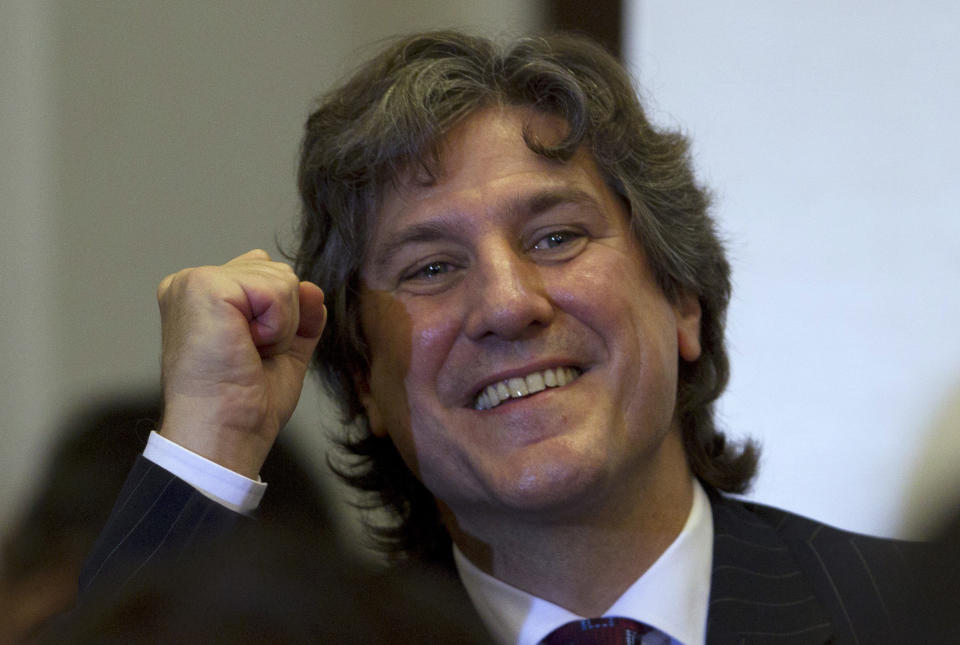Argentine president names YPF leader
BUENOS AIRES, Argentina (AP) — Argentina officially recovered its leading energy company from private control on Friday as President Cristina Fernandez signed her expropriation measure into law and named a youthful Argentine as its chief executive.
The country's leading politicians and all her top appointees gave her a standing ovation as she signed the measure sealing the fate of Repsol. The Spanish company now has little chance of seeing the $10.5 billion it says its shares in YPF SA are worth until years of legal battles are resolved, if then.
She praised congress for overwhelmingly approving the takeover, and called it an affirmation of Argentine sovereignty that is far more important than any party differences.
"We want an YPF with an absolutely professional profile," Fernandez added, describing her search for Argentines with deep experience in the global oil industry to run the company.
Her choice: Miguel Galuccio, an Argentine engineer who left YPF after Repsol bought it in the 1990s and rose through the ranks of Houston, Texas-based oil services giant Schlumberger Ltd.
She stumbled slightly in pronouncing Galuccio's name and then urged him to stand up from front-row his seat alongside Axel Kicillof, the economist she appointed to root through YPF's books for clues to its true worth. Both represent the future, she said.
"These are young men who want to take on historic challenges, to take responsibility for them and make sure that government is part of the solution," she beamed.
Galuccio resigned as president of Schlumberger's production management division in London and told his staff he was returning to Argentina on April 16, the same day Fernandez decreed the YPF takeover, the daily Ambito Financiero newspaper reported.
"Miguel seems like a good choice to lead the new YPF," Stephen Ellis, a senior equity analyst who follows Schlumberger for Morningstar, Inc., told The Associated Press on Friday.
"I'm not condoning Argentina's nationalization of YPF, which is a bad thing, but Miguel is a reasonable choice for the role," since his unit operates in ways that are "pretty similar to running a regular oil and gas company," Ellis said.
The markets seemed to agree: YPF shares rose 8.5 percent to close at $15.35 Friday on the New York Stock Exchange after Galuccio's pending appointment was reported.
Still, Galuccio has just turned 44, and taking over the executive offices of Argentina's largest company is a big jump from division president of an oil industry services provider. His immediate challenge is recruiting more experts to help. A shareholder assembly will be held July 4 to approve the management team.
There are other Argentines with more experience in the top rungs of major oil companies, but "the issue is if they want to work for the government," said Gustavo Calleja, who was deputy energy secretary under Argentine President Raul Alfonsin.
Simply taking Repsol's shares without paying compensation in advance has prompted waves of criticism from Spain, the European Union, the United States and even some Latin American leaders.
But Fernandez said that "in a complex world, in a world that's almost hostile, we are committed to keep working amid all these competing interests for the good of the people."
Argentines can be hard to deal with, she acknowledged.
"We aren't an easy people. We can be difficult. But we are a people with a tremendous capacity to make the most of our resources," she said. "That's why we take on these tough challenges."
Calleja said the challenges include:
— Argentina has the world's third largest shale reserves, after China and the U.S., and yet needs billions of dollars in new investments to begin to exploit them.
— Despite being Argentina's biggest energy player, the company manages just 30 percent of the country's reserves; the rest is controlled by multinationals which, like Repsol, have been slow to exploit domestic production.
— YPF has the technical capacity to increase production, but nowhere near the level of Petrobras or other industry heavyweights.
Fernandez suggested that quickly raising consumer prices to make production more profitable remains a political non-starter.
Instead, she urged oil companies to make long-term commitments to Argentina. "No one wants to lose money, but again, profits need to be reinvested so that the economy can steadily grow in an unstable world," she said.
The message also applies to workers, she warned, urging union leaders not to sabotage energy supplies. "Argentines need to be patient and learn not to expect everything tomorrow," she said.
Galuccio's expertise is in the "upstream" side of the business. Schlumberger handles the entire process of extracting energy for state-owned oil companies around the world, and takes a small percentage of the value of each barrel sold, but doesn't claim the reserves. In other words, it works hard to coax the most oil and gas possible from difficult wells at minimal expense, but leaves the oil's destiny to be determined by its clients, Ellis said.
The model likely appeals to Argentine officials who know they need experienced partners to exploit the shale deposits, but are leery of entering into disadvantageous deals after blaming Repsol for its current energy crisis.
Repsol, in turn, blames interventions and price controls for making it unprofitable to extract vast oil and gas more quickly.
Any energy firm operating in the country now faces the threat of intervention if it doesn't make recovering Argentina's energy self-sufficient a priority. This means selling to domestic consumers first, even if it means missing out on higher returns from exports.
This law gives the government the control it wanted while leaving the responsibility for results in private hands.
This is an expropriation, not a nationalization, Fernandez said, because the new YPF is being established as a private corporation, and thus free from the oversight of the nation's auditor general, even though the national government and its provinces will together control 51 percent of the shares.
___
Associated Press writer Almudena Calatrava contributed to this report.







